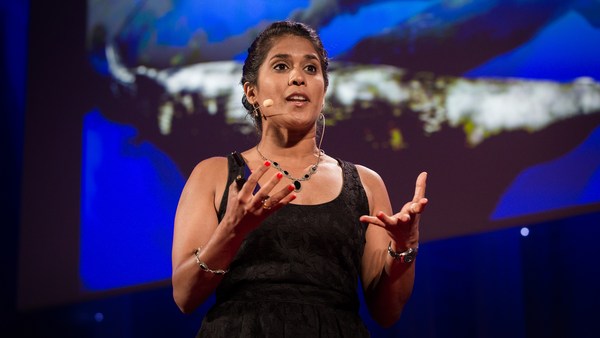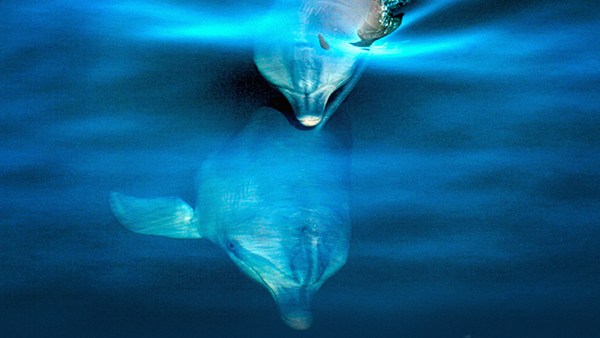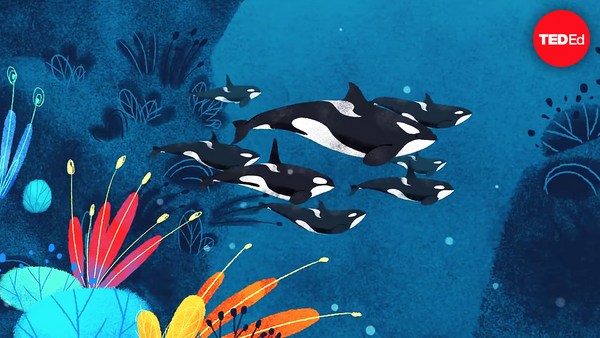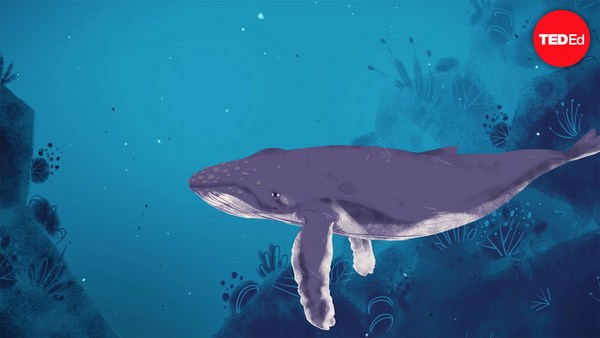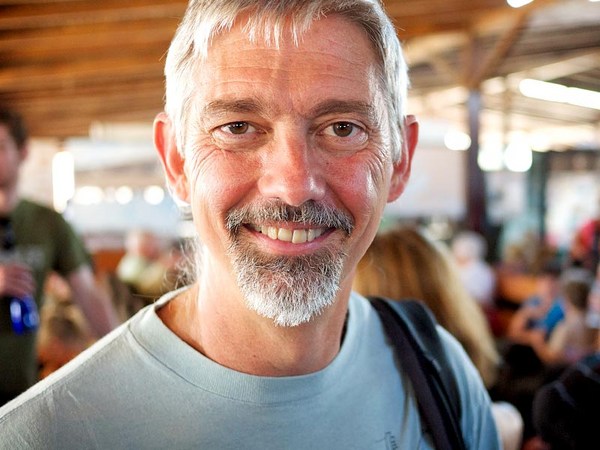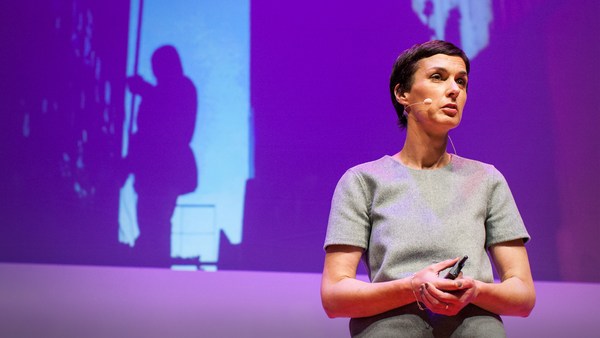Most of the ocean is dark. It's a darkness so deep that only three people have ever reached its end. It's a darkness so vast that it covers the world's longest mountain range, and its grandest canyons. It's an elusive dark, that covers most of our planet. We have put people on the Moon and robots on Mars, but the deepest parts of our world's oceans, where the sperm whales make their home, are still mostly a mystery. In 2005, I started the Dominica Sperm Whale Project, and over the last 14 years, I've literally spent thousands of hours in the company of sperm-whale families. It's really been the first time that anyone's come to know these biblical Leviathans as individuals, with personalities, as brothers, and sisters, and mothers, and babysitters. Let me introduce you to Enigma. I followed Enigma's family since before he was born. I watched him nurse from his mom, and play with his cousins. I watched him dive deeply with his mother for the very first time. When Enigma was born, he was three meters long, in a metric ton, you know, average for a sperm whale. But in about 25 years time, when Enigma is fully grown, he'll be as long as two school buses and weigh as much as ten of them. The male sperm whale is one of the largest animals on the planet. He will become Moby Dick. And when his mom, Mysterio, makes deep dives, she's one of the longest and deepest divers on the planet. She can hold her breath for over an hour, and make dives three times as deep as a modern nuclear attack submarine. Most of her life will be spent in the darkness of the deep ocean, and only ten minutes out of every hour will be spent in the part of the ocean that the light touches. As a result, her world is a world of sound. And just like bats, sperm whales have evolved a system of echolocation, to see in the dark. Her unique nose has evolved as the most powerful natural sonar system on the planet. She uses it to dive deeply into the ocean to hunt for squid and, as a result, is a significant part of the ocean ecosystem. Globally, sperm whales remove as much biomass from the ocean as all of humanity's fisheries combined. But Enigma is still young, and so he'll stay at the surface, next to my boat, while his aunt Pinchy is up at the surface giving milk to his younger cousin Tweak. Sperm whale society is matrilineal, it's grandmothers, mothers, and daughters who live together for life, caring for each other, and defending their family. Family is critical to survival. In the vast darkness of the open ocean, all that they have is each other. Pinchy, Tweak, Quasi, Scar, Fingers, Digit, Mysterio, and Enigma. These are all animals in a family that I've called The Group of Seven. We give them names mostly based on physical characteristics that allow us to recognize them. Fingers got her moniker because, early on, she had two marks on her right fluke that looked like she was giving the peace sign. So, some of these names seem pretty flippant, but we don't give them these names lightly. It makes an important point about individual identity. These animals are not interchangeable. Pinchy is not fingers, and when one of them dies, all of them who knew her will be affected. And when one is born, it's a cause for celebration. The Group of Seven is the best studied family of sperm whales in the world, and they've taught me all the minutiae of life as a family in the open ocean. They live rich and complex lives in parts of the world that we find difficult to even explore. It's a community of neighboring families that is really a multicultural, oceanic society. Behavior is what you do, but culture is how you do it. Sperm whales are all sperm whales, they do the same thing, so they feed, they dive, they swim, they defend their babies. But how they do it is different, just like some humans have learned to eat with forks and other humans have learned to eat with chopsticks, sperm whales differ in how they eat, what they eat, where they roam, how far they roam, their social behavior, and probably a whole bunch of cultural ways we don't understand yet. And they appear to identify these cultures with distinct dialects, distinct sets of "codas." (Sperm whale clicks). Every family that speaks the same dialect we call a clan. The Group of Seven belongs to the Eastern Caribbean clan. And in the Eastern Caribbean, they use about 22 different coda patterns; one to recognize individuals, another set to recognize the families, and one unique one that they use to mark their cultural clan. Every whale in the Eastern Caribbean makes the one plus one plus three coda. (Sperm whale clicks) It's unique to them, it's only ever being recorded in the Caribbean, and it's been identical for the last 30 years. It takes a newborn about two or three years to learn to make it right. They'll actually babble and make a whole bunch of different sounds before learning to make these calls accurately. And they need to make it right, because they need to be able to make their cultural clan, where they belong, recognizable across these huge geographic scales that these animals exist across. When two families of sperm whales meet at sea, they need to be able to recognize each other, because it turns out that families that speak the same dialect, families from the same clan, will spend time together, and families that speak a different dialect, from different clans, will not. Now, these whale cultures aren't trivial. They're part of their identity, just as my heritage is a part of my identity. Where I come from makes up so much of who I am, and who I am defines so much of what I will do. Unfortunately, as a result of climate change and human impacts, this clan that lives so near the islands, so near to us, is at risk. There's less than 300 animals left in the Caribbean clan, and 1 in 3 babies born off Dominica will not make it to their first birthday. April 3rd 2010, that's the last day I saw Enigma alive. The Group of Seven is now only three: Pinchy, Fingers and her new calf Digit. And in 2015, Digit got a rope-tied around her tail. She was only four. She doesn't dive deeply anymore, and she's struggling to survive. Fingers has had to start nursing her again. Every calf counts, especially when families are so small. If these families are going to perpetuate themselves, they need to make sure that every calf survives, and that's just not happening. Every year, when I leave, I wonder which one of these newborn calves I won't see again. Every year, when I come home from the ocean, I wonder which whale I know so well will be gone. Losing individual animals that you know so well has been a tragedy for me. And faced with this new reality, I've asked myself two questions: Why? Why are they dying? And the answer is: it's us, it's all of us. Whales get hit by the ever-growing, ever-faster, ever larger, ever omnipresent, shipping fleet that brings us the economy from the around the world. Pinchy was hit in 2010, but she's a lucky one, she survived, but she still has the scars to remind her every day. And in her world of sound, I wonder how fearful she is of the ever-present ship noise. Whales are also entangled in our fishing gear, entangled to the extent that the ropes cut into their flesh. Digit has been towing around this rope for over two years. She's only six. I have a five-year-old at home. It's hard not to think about how a chronic injury like this would affect the whole dynamic of my family. This rope creates substantial amounts of drag, and that drag is going to exhaust her. And as she grows, the rope that's tied around her tail will cinch it off. It's hard. On a night like tonight, that's so exciting, it's easy, really, to forget that they're out there struggling, and nursing, and living. Their lives go on in parallel to ours, mostly unnoticed, and the worst thing we've ever done to the citizens of the ocean is to have ignored them. We've been killing whales for hundreds of years, but we do so now out of ignorance, rather than intent. And if we're going to change that, we need to be able to speak with authority about what's going on out there in the world, and then question those who have the authority to make real changes in the way that we interact with our oceans. But the second question, is an even heavier one, and critically important. What happens when they're all gone? What do we lose, when we lose an entire whale culture? And I don't think that's a question that we've answered for ourselves, for humanity, for our own cultures, for our own identities. What is lost when we lose a way of life? Every culture, whale or otherwise, is a set of solutions on how to survive the environment in which we live. If we lose a culture, we lose all of the traditional knowledge of how to succeed. And we can't necessarily get that back. Even if the global population of sperm whales could move back into the Caribbean, they would be other whales from elsewhere, who do things differently. And there's no saying that they would survive, there's no saying that they would succeed, and that's an important point about conservation. If we're going to protect species, we need to define biodiversity to include the definition of cultural diversity. Sperm whales have been sperm whales for longer than we've been walking upright. Their societies are far older than our societies, and one of the reasons that they succeed, is their cultural solutions. Traditionally, we've managed wildlife around the world using genetics stocks, but genetics can't preserve the diversity of life. The diversity in a sperm whale life is in their cultural traditions, just as it is in our own. Their cultural stories are simple: love your mom; learn from your grandmother's experiences; be a good neighbor; care for each other; respect different solutions to everyday problems, and share the burden of your day, by working together. If I've learned one thing from spending time in the culture of whales, it's the power of community. Life is about the quality of the relationships we build with those around us. And this is our community, and most of it is ocean. In the darkness of the hardest times, communities come together to overcome unimaginable obstacles. And these problems are huge, they're on a global scale, and I don't have the answer to everything. But know that we're making progress, know that your small acts of kindness and empathy can save whole lives, know that with every birth of a new sperm whale calf it gives me hope for the next generation. So I'm here not to let us remain immune to the suffering that these whales are going through, to not allow us to be ignorant of the damage that we caused to parts of the world that we don't often see. But I'm also here to celebrate them, the beauty and magnificence of a sperm whale. How amazing their lives are! If we can find such deep similarities between the life of a sperm whale and our own lives, between their values and our values, how different can we all be? We need to come together and learn from each other to live together on this shared planet. We need to respect all people, and all species. If we're going to preserve life, ours and theirs, we need to coexist, both above and below the surface. We need to value cultural diversity in our societies and the ecosystem, but if I'm going to build this new global community, I can't do it alone. So I'm counting on you. Thank you. (Applause)
